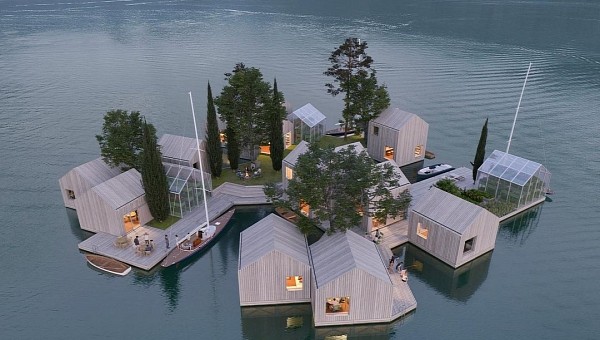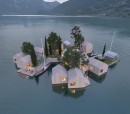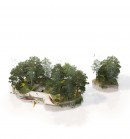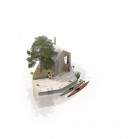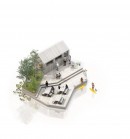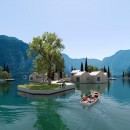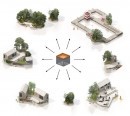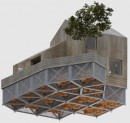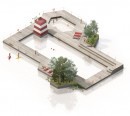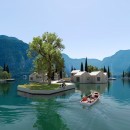Climate change is forcing humanity to think of alternative options for pretty much everything, from fuel to housing options. As far as the latter is concerned, floating cities or floating houses are emerging as the ideal solution, as long as we stop repeating the mistakes of the past.
One of these mistakes from the past, according to Danish Maritime Architecture Studio MAST, would be to use the same construction materials for the floating base of these future homes. Not only are they harder to transport, but they’re far from environmentally friendly, which, in the end, would defeat the whole purpose, since it’s the same recklessness for the environment that has brought us where we are today.
Rising sea levels and the increase in the number of annual floodings on land have introduced the idea of floating homes as the solution to both issues. A floating home won’t be affected by rising sea levels, nor will it matter for residents if flooding happens. As long as residents inside the home have the means to support themselves, they should be able to ride out whatever Mother Nature throws at them.
That said, MAST believes that the floating home of tomorrow would have to be different from current floating homes, in order to be weather-resilient, more efficient, off-grid capable, and an overall winner. A start would be something like Land on Water, the new project from MAST, which proposes flat-pack modules made of recycled plastic as the base on which you could build basically any type of structure.
Designed in partnership with Austrian civil engineer Hubert Rhomberg and venture firm Fragile, Land on Water could be anything a community would need. The base consists of, as noted above, modules made of recycled reinforced plastic, to which weight can be added or removed according to whatever will be built on top. These modules are flat-packed, so they could be transported worldwide with ease, and combined in whichever way to create the perfect floating space for a particular community.
“The system offers a sustainable and highly flexible solution for building almost anything on the water; from floating houses in Seattle, to floating campsites on Oslo fjord, to saunas on Hobart’s riverfront,” MAST says. One such Land on Water unit could be a garden, another – a public park, a cluster of them – homes with connecting walkways and greenery, while others could serve as saunas or public gyms.
The design is inspired by the gabion construction, a term from civil engineering that refers to a welded wire cage or box filled with materials like stone, sand, or concrete, and that is commonly used for road building. A gabion is cheap, but durable and multi-functional. MAST puts a new spin on it, in that the cages are now filled with locally-sourced upcycled flotation: plastic waste. Flotation can be adjusted according to each situation.
The biggest advantage of Land on Water, besides modularity and the ease of transportation of the flat-pack modules, is that these floating units would be much more friendly to the environment, as compared to similar constructions that use steel and concrete foundations. In those cases, the steel or the concrete is treated with coatings or anti-fouling paints that can be toxic to the environment; with Land on Water, the base would provide “an ideal habitat” for fish, crustaceans, and seaweed. It would be a win-win situation.
For the time being, Land on Water exists only in that CG-magical universe of renders and ideas. MAST believes in the viability of the project, so it’s now working on a floating prototype pavilion that would highlight the many benefits of such a floating structure. Partners are welcome.
“Land on water will provide a climate resilient and adaptable solution for the construction of new floating buildings worldwide, but could also lead to an entirely new type of dynamic and organic off-grid floating community and an alternative to the large master-planned floating cities currently under development which repeat many of the mistakes made by urban planners in the middle of the 20th century,” the studio says. Many of the current projects of floating cities are insanely prohibitive in terms of pricing, regardless of how impressive they are in scale and features. Something like Land on Water sounds like a floating community even regular folk could actually live in.
Rising sea levels and the increase in the number of annual floodings on land have introduced the idea of floating homes as the solution to both issues. A floating home won’t be affected by rising sea levels, nor will it matter for residents if flooding happens. As long as residents inside the home have the means to support themselves, they should be able to ride out whatever Mother Nature throws at them.
That said, MAST believes that the floating home of tomorrow would have to be different from current floating homes, in order to be weather-resilient, more efficient, off-grid capable, and an overall winner. A start would be something like Land on Water, the new project from MAST, which proposes flat-pack modules made of recycled plastic as the base on which you could build basically any type of structure.
“The system offers a sustainable and highly flexible solution for building almost anything on the water; from floating houses in Seattle, to floating campsites on Oslo fjord, to saunas on Hobart’s riverfront,” MAST says. One such Land on Water unit could be a garden, another – a public park, a cluster of them – homes with connecting walkways and greenery, while others could serve as saunas or public gyms.
The design is inspired by the gabion construction, a term from civil engineering that refers to a welded wire cage or box filled with materials like stone, sand, or concrete, and that is commonly used for road building. A gabion is cheap, but durable and multi-functional. MAST puts a new spin on it, in that the cages are now filled with locally-sourced upcycled flotation: plastic waste. Flotation can be adjusted according to each situation.
The biggest advantage of Land on Water, besides modularity and the ease of transportation of the flat-pack modules, is that these floating units would be much more friendly to the environment, as compared to similar constructions that use steel and concrete foundations. In those cases, the steel or the concrete is treated with coatings or anti-fouling paints that can be toxic to the environment; with Land on Water, the base would provide “an ideal habitat” for fish, crustaceans, and seaweed. It would be a win-win situation.
“Land on water will provide a climate resilient and adaptable solution for the construction of new floating buildings worldwide, but could also lead to an entirely new type of dynamic and organic off-grid floating community and an alternative to the large master-planned floating cities currently under development which repeat many of the mistakes made by urban planners in the middle of the 20th century,” the studio says. Many of the current projects of floating cities are insanely prohibitive in terms of pricing, regardless of how impressive they are in scale and features. Something like Land on Water sounds like a floating community even regular folk could actually live in.
